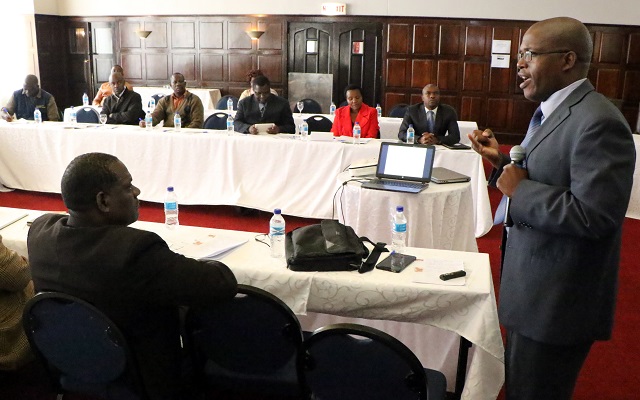‘Engage more stakeholders in policy decisions’


Dr Nyasha Kaseke addresses delegates during yesterday’s National Economic Consultative Forum dialogue at a Bulawayo hotel
Prosper Ndlovu, Business Editor
GOVERNMENT has been urged to increase stakeholder engagement and roll out awareness campaigns on key policy decisions to obtain a buy in from ordinary citizens.
Contributing during a National Economic Consultative Forum (NECF) indaba held in Bulawayo yesterday, representatives from the business community said negative perception and lack of confidence in governance issues was affecting economic growth.
The participants singled out the high appetite for imports, externalisation of funds, tax evasion and general lack of confidence in the banking sector as examples of lack of public confidence in the country’s economy.
Dr Nyasha Kaseke, a lecturer from the University of Zimbabwe’s Graduate School of Management led the discussion, which was focused on taxation and pricing issues in the economy.
The meeting saw participants exchanging views on the country’s investment policies and coming up with recommendations towards enhancing economic growth.
Businessman, Mr Dumisani Sibanda said key parastatals and regulatory bodies such as Zimra, NSSA and EMA need to be engaged to appreciate the effect their operations have on businesses as they contribute immensely to the cost drivers.
The participants alluded to resistance by some players in the informal sector to regularise their businesses, which they blamed on failure to appreciate the significance of formalising and paying taxes to the State.
Some suggested that Government tightens its laws regarding collection of fines by different regulatory bodies including the police, which they felt should be centralised so that all monies were controlled by Treasury.
The participants said governance loopholes evidenced by acts such as smuggling, externalisation and illegal foreign exchange deals, bribes at roadblocks and tax evasion, were indicative of lack of public confidence in the country’s systems.
They condemned corruption across sectors and pledged to work with Government in coming up with measures to weed out the vice.












Comments